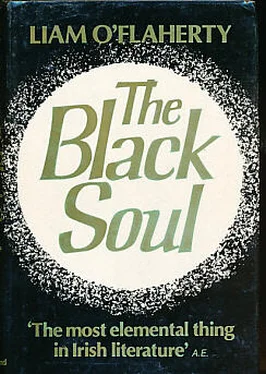The Stranger grasped his hand and said, ‘O’Daly, you’re a friend indeed. I’ll never forget you.’
The old man muttered an oath under his breath and shouted gruffly to hide his embarrassment. ‘Come on, damn it, there’s no time to waste.’
When they entered Rooruck, it was deserted like a place suddenly stricken with a plague, and the Stranger darted into the cabin to get his money and his clothes, as if every moment he had to spend in the place were a torture to him. Rushing about the cabin he started at every sight, at the bitch that lay curled carelessly on the hearth, with the wind coming down the chimney, blowing the yellow ashes about her snout, at Red John’s waistcoat lying by the stool where he had dropped it, at the upturned milkcan, and the stains of the spilt milk licked dry by the dog. But when he was passing through the kitchen on his way out, dressed in his wrinkled blue suit, with a suit-case in each hand, he looked around and heaved a sigh. For it is sad to look at even hateful places for the last time. Then he rushed out and they walked away hurriedly towards Coillnamhan. ‘I’ll get you some clothes from my daughter’s wardrobe,’ O’Daly was saying to Little Mary; ‘now for God’s sake keep your heart up. Everything is all right. I’ll see to everything. You have life in front of you.’ And as they reached the brow of the hill east of Rooruck, a weird song was carried to them on the wind from the southwest. They paused and looked back. The peasants, carrying the dead body of Red John on their shoulders, were coming in a straggling procession from the cliff, the men in front, the women behind, their shawls thrown back over their shoulders, their frieze petticoats waving in the breeze against the black sky, their hair dishevelled, their voices rising and falling mournfully through the changing rush of the wind. And behind the corpse the white-haired wife of Red John’s uncle staggered, rending her hair, and her voice came distinct over the din, chanting the death dirge. ‘And the screech heard at dawn shall be ever in my ears, ochon, ochon … my sorrow pierces the bowels of the sea, oh my sorrow, my sorrow …’
They shuddered and sped eastwards hurriedly.
3
That evening the Stranger and Little Mary set sail in O’Daly’s yacht from Coillnamhan for the mainland. Night was falling as they scudded out under white sails. O’Daly sat at the helm and the Stranger sat with Little Mary in the prow, looking back at Inverara. Inverara was becoming an amorphous mass through the autumn mist, a black smudge on the horizon. Then it disappeared, and only spectres of white breakers arising from the deep to embrace it remained, where it sank out of sight. Farther, and only the distant mumble of the sea against its cliffs reached their ears. Then that sound died in the murmur of the wind, through the yacht’s sails.
Inverara had passed out of the Stranger’s life. Tears trickled down his cheeks and he pressed Little Mary’s hand. Inverara, wild, fierce, beautiful, never-changing Inverara, child of the sea, had vanished.












